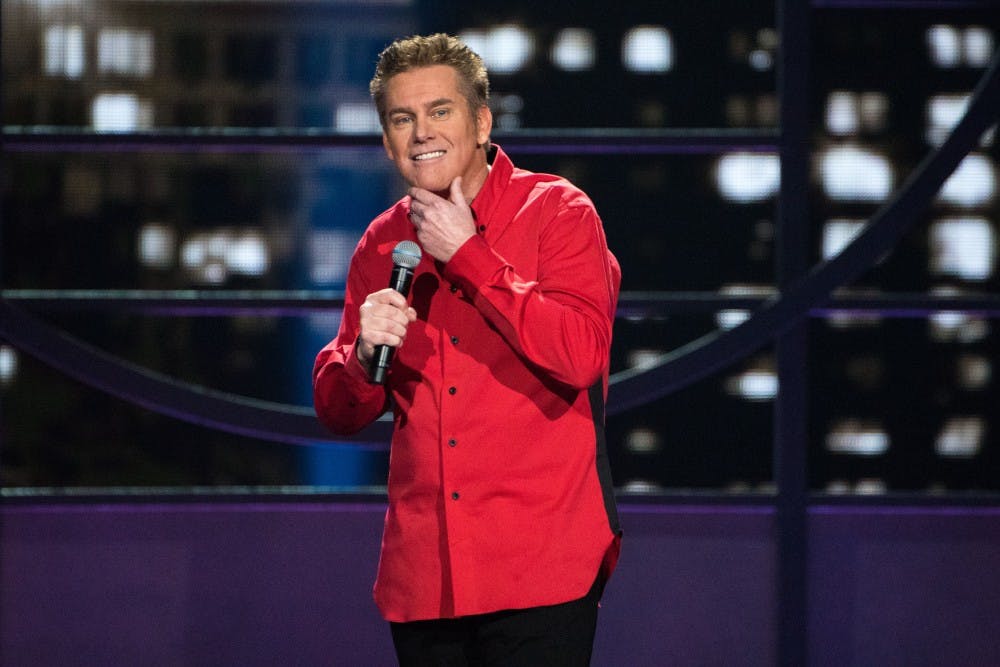Brian Regan doesn’t think he’s a household name.
But with multiple Netflix specials, collaborations with Jerry Seinfeld and David Letterman and an appearance on Jimmy Fallon, Regan might be the only one who thinks so.
Regan released his first comedy CD in 1997 and now has seven hour-long specials. The comedian made a cameo in Chris Rock’s “Top Five,” is in two episodes of Seinfeld’s “Comedians in Cars Getting Coffee” and appeared on “The Late Show” 28 times.
And his ‘non-household’ name is coming to the Chautauqua Institution on Aug. 9 for a night of new jokes, not the ones from his 28-show run on Letterman.
Before the night of clean humor, we caught up with Regan to discuss the history of comedy, controversial jokes and his upcoming performance.
Our discussion, lightly edited for length and style, follows below.
The Spectrum: In 2015, you did the first ever live stand-up set on Comedy Central. What was it like to be involved in that experience for the network and as someone who has been doing comedy for over 20 years?
Regan: We were the ones that pitched the idea to them. And I had done stand-up specials before, but I wanted to do something different and challenging. So I thought, ‘Hey, live is challenging.’ I wanted to do it just to experience it. And it was –– maybe scary is overstating it –– but it was definitely concerning. Because you don’t know what’s gonna happen. There could be technical problems, there could be somebody in the audience who decides to be a jerk.
You know, how are you gonna’ deal with that? We had to have a lot of contingency plans. I mean I’m on stage and it’s like, this baby’s going out live. I had to nail –– or try to nail –– every word, every moment, every sentence. And you can’t fix it if you blow it. So anyway, it was a fun experience. I’m glad I did it, I probably wouldn’t do it again. I’m proud of what I did but from now on I’ll go back to the old, conventional tape-ahead-of-time format.
TS: In music lately, there seems to be a divide in older, more “classic” artists and newer artists. Do you see a similar trend in comedy? And do you see yourself in that role as one of the curators of comedy?
R: Well, I have always guarded against a few things. One is trying to think of comedy as a competition. I’ve tried to guard against the ‘us against them’ type of mentality. So if somebody wants to approach comedy in a way, that’s different than how I approach it, that’s fine. You know, that’s part of the evolutionary process of comedy. But I like how I do my comedy, I get to create how I do my stuff and what I want to do with it. I’m not telling anybody else what to do and I just prefer they don't tell me what I should be doing.
TS: How have you seen comedy change?
R: Comedy’s changed a lot over the years. I mean, you go back to –– I mean, I’m going back historically, now –– Richard Pryor, George Carlin before they became the people that everybody knows them for, they were much more conventional and clean and mainstream. Comedy went from just being very wholesome to being a little bit edgier and a little bit more real. And then, I remember watching Adam Sandler do a set and he had this silly routine about opening his refrigerator and seeing Elvis Presley near the lettuce. I remember scratching my head going ‘Now, this is odd.’ It’s just silly –– I don't mean ‘just’ in a diminishing way –– it’s different. And I remember noting that as a change.
And now a lot of comedians like to get down and dirty and get very real. A lot of foul language and rough subject matter. But I am okay with all of that, I believe in freedom of speech, and people should do whatever they want to do.
TS: You don’t use profanity, what was behind that decision?
R: I want to see how hard I can get people laughing without hitting certain buzzwords. I always found that people laugh disproportionately at shock, and I want to make sure they’re laughing at substance and not in shock.
It’s titillating to hear somebody say a foul word, a four-letter word, through a sound system. I’m not opposed to it. If it’s organic to the person telling the story, great. I have no problem with people doing it. But I just enjoy the challenge of trying to see how hard I can get people laughing without hitting the f-word.
TS: Do you try to engage different sects of audiences? Or do you try to focus more on your own personal brand?
R: I’ve always thought it was a mistake to try to figure out what the audience wants. I don’t think that’s my job, nor is it anything that interests me. I’m not on stage saying, ‘Hey, what do you want to hear?’ I’m on stage because I’ve thought of things, I have this brain that comes up with quirky thoughts and observations and I want to share them.
So my audience, hopefully, is just people that want to hear these things. But once you cross that line of trying to figure out what they want, that to me is a very clear line in the sand. I don’t want to go over there. I don’t care what they want, I care what I want to tell them. I hope they like it. But it’s tough, [my set is] what I’m here to share with you.
TS: You have made jokes referencing the Israel-Palestine conflict and other controversial subjects. Have you ever received backlash for topics that you use during sets?
R: Usually I don’t deflect to those topics. But I like to dip my toe in the water and touch on some things that would surprise people, like the Israeli-Palestinian thing. I get a little pushback. Once you touch on anything people are going to push back.
I saw somebody comment on my social media, they were angry at me because I did a joke about how parties get ruined because of political discussion. So somebody said, ‘Hey, we have a right to be angry’ and ‘la-da-da-da.’ You have a right to be angry, I have a right to have my thoughts too.
I do like to –– especially over the last few years –– hit on things that can be controversial. But I try to do the kinds of jokes that both sides can laugh at. But it’s always tricky. You’re gonna’ have people who are passionate. But I can’t worry about that. I still need to, at the end of the day, share what I want to share.
TS: Are you working on new material for any future specials?
R: I have a two stand-up special deal with Netflix, the first one already came out (‘Nunchucks and Flamethrowers’). The next one, we will be shooting this coming year to come out around Christmas time of next year, 2020. I am working toward a new hour for that.
There’s always three simultaneous goals. I’m always working on individual jokes, I’m working on five-minute routines for talk variety shows like Fallon or Letterman and I’m working on hours. Those three goals are always happening. So it’s fun having three simultaneous goals.

Jacklyn Walters is a senior communication major and The Spectrum's managing editor. She enjoys bringing up politics at the dinner table and seeing dogs on campus.





